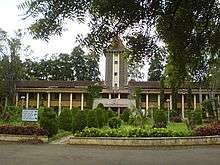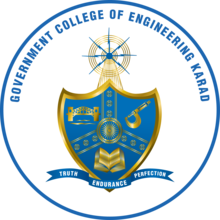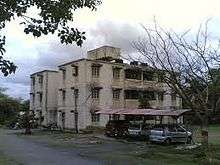Government College of Engineering, Karad
Government College of Engineering, Karad (GCEK) is an autonomous technical institute in Maharashtra state in India. It was established in 1960 and was affiliated to the Shivaji University till 2015 after which it became an autonomous institute. The autonomy was granted by the UGC.[1][2] Karad is a culturally vibrant town and is a sought after center of education in Western Maharashtra.
 | |
| Motto | Truth, Endurance, Perfection |
|---|---|
| Type | Government Autonomous Institute |
| Established | 1960 |
| Principal | A.T. Pise |
Academic staff | 80 |
| Students | 1,550 |
| Undergraduates | 1,150 |
| Postgraduates | 400 |
| Location | Vidyanagar, Karad , , India 17°18′31.52″N 74°11′5.61″E |
| Campus | 70 acres (28 ha) |
| Affiliations | AICTE, Shivaji University |
| Website | www |
 | |
The students and alumni of Government College of Engineering, Karad are colloquially referred to as GCOEKians.
Over the years the college has produced about 10140 engineers and more than 700 computer professionals through a Master of Computer Application course in the Engineering faculty.
Government College of Engineering, Karad is located in Vidyanagar, Karad besides Saidapur.
History
Government College of Engineering, Karad is one among seven engineering colleges established by the State Government of Maharashtra and first among those established post-independence. The prime objective of establishing the college was to impart technical education to the youth in rural parts of Maharashtra. Basically three institutes i.e. Engineering College, Government Polytechnic and Pharmacy College started functioning in the same premises. Other colleges were then shifted to their independent premises and the heritage building was retained by the college. The college was established in 1960 with undergraduate programmes in three core branches of Civil, Mechanical and Electrical Engineering, initially affiliated to Savitribai Phule Pune University and subsequently to Shivaji University in 1972. Post graduate programmes (Master of Engineering) in these disciplines too were started in 1967.
The UG programs in Civil, Mechanical and Electrical are ‘permanently affiliated’ to Shivaji University. In response to the drive of globalization and industry needs, the institute started MCA (Master of Computer Applications) course in 1992. This was the only engineering institute in Maharashtra to offer the MCA course in engineering discipline.
Subsequently, in 1995 all disciplines of the institute were approved by AICTE (AICTE established in 1994). With the boom in Information Technology, Directorate of Technical Education, Maharashtra (DTE) shouldered the responsibility of starting the bachelor's degree course in IT to cater to the need of meritorious students in this region and the new branch of engineering in Information Technology was started in the institute from 2001. In due course of time, the institute has also started an undergraduate programme in Electronics and Telecommunications in 2007.
Currently, GCEK offers five UG and eight PG programmes.
Departments
- Electrical Engineering Department
- Civil Engineering Department
- Mechanical Engineering Department
- Information Technology Department
- Electronics and Telecommunication Engineering Department
- MCA Department
- Applied Mechanics Department
- Mathematics Department
- Physics Department
- Chemistry Department
Admissions
Undergraduate
The admissions to the college are governed by the Directorate of Technical Education (DTE). The DTE previously hold the all Maharashtra State level MH-CET (Maharashtra Common Entrance Test), which was a compulsory examination to admission in engineering (from 2005 to 2013). From 2014 onwards, The Score of All India JEE Main (Paper 1) and HSC Marks shall be considered for preparing the merit and admission purpose (as per the Maharashtra Government Resolution Dt. 31 Oct 2012). Now the score of MHT-CET is necessary to get admission into the Government Colleges in Maharashtra, while the score of JEE Mains Paper-1 is only applicable for private Engineering Institutes. [3]
The ratio of girls students to boys students is 34:66. Being a government institute, all seats are strictly filled as per government norms.
Programmes
Government College of Engineering Karad offers 5 undergraduate and 6 post graduate programmes. Details are:[2]
- Master of Technology (M.Tech)
- Construction Management – Started in 2005
- Structural Engineering – Started in 1967
- Electrical Power System – Started in 2005
- Heat Power Engineering – Started in 2005
- Production Engineering – Started in 1967
- Design Engineering – Started in 2019
- Computer Science and Engineering – Started in 2019
- Master in Computer Application (M.C.A.) – Started in 1992
- Bachelor of Technology (B.Tech)
- Civil Engineering – Started in 1960
- Information Technology – Started in 2001
- Electrical Engineering – Started in 1960
- Electronics and Telecommunication Engineering – Started in 2007
- Mechanical Engineering – Started in 1960
Campus
The campus is situated in Vidyanagar, Karad. GCEK has a beautiful green campus of about 40 acres(161874 m2). All departments & laboratories are housed on the campus. Residential accommodation for teaching & non-teaching staff of the college are available on the campus. Consciously developed, the campus has retained & increased its green cover, rich in natural flora & fauna, & provides an attraction for bird watchers.

The college provides residential facilities for both undergraduate boys and girls. Due to limited vacancies, admissions are merit-based. There are three residential buildings in the hostel campus. Boys' blocks are named B, C, D. The total capacity of boys hostels is 480. For girls, there is one block, namely, Jijau. This was constructed keeping in mind, the huge number of the college's girl-students staying outside. Its capacity is 240. Jijau is four storied, and the remaining buildings are three storied. For PG there's a hostel for boys with capacity of 45. The ambiance around the hostels is very good and we can fell the nature there.
Further it comprises the principal's residence, hostel office, security room, rectors' quarters, a co-operative store, students' dining rooms.
The institute also has a well-equipped gym for students. The Gymkhana consists of Gymkhana Secretary along with secretaries of various sports and cultural committees.
The institute has a large ground for sports activities including cricket, football, volleyball, kabbadi, kho-kho.
Library
The Central library is equipped with Library software with Barcode System (OPAC). It has around 28279 titles of text/reference books with a volume of 65583 in the relevant disciplines of engineering. It also has around 80 top national and international Journals. Students can also avail the book bank facility. Every department has its own departmental library, maintained by students through their respective associations.
Gymkhana
Incubation Center
Digital GCEK
Government College of Engineering Karad is follower of Digital India and Maharashtra DigiDhan awareness programme. Receive nothing in cash (fee/fines/deposits) i.e. Students fee collected through the online payment system. Pay nothing in cash (wages/salaries/vendor/agency payments) i.e. payments are done by using online payment system. Faculty/staff/students to uses cashless systems in all payments like canteen bills etc.
Training and Placement Cell
Company Visits: This year is encouraging for IT and IT related companies. Even though declined market position students participated in about 43 companies for placement and more 15 companies are expected by July 2019 for this batch of UG and PG students. The most important news is this year our two students bagged a package of 6.0 lakh per annum. Placement has reached to 151 (up to 31 May 2019). This achievement is due to our strong bond with industry in last 58 years and our alumni who prove by work the quality of GCE Karad. Companies like Lodha, Torrent Power, Bobst etc. are new additions this year with highest package of 6.0 lac per annum. Due to this average package is also raised to 3.4 lac per annum. Alumni Connect 2018 On 5 October, Training and Placement Cell of GCEK organised Alumni Connect 2018 where 1993 alumni from many companies participated. It was a day long program with panel discussions on Talent Acquisition and Talent Management. @400+ pre-final year students participated in this program.
Training to Students: In addition to regular classes, TPO conducts different programs for Personality Development, communication skill and professional skill development. For aptitude test training we Hired online subscription Breathing Brains for aptitude test practice to students. Every department organised expert lectures from industry person to understand industry requirements and industry expectations. Staff members Mrs.P.R.Jadhav. Ms. G.S.Dhende, Prof.L.L.Kumarwad, Prof. Mrs. Nikita Shetty, Prof. Chetan Andhare and Prof. SaurabhYadav are key persons in placement activities. Valuable guidance of all department heads is useful to students for best placement. Now observing to change of student's choice, we are organising more start-up and competitive exam preparation activities as trend to placement is not lucrative for students nowadays. Students are encouraged for participation in innovative idea generation workshop and project competition held by Principal, John Deere, Whirlpool, TCS, KPIT etc.. Every department is having Industry Expert Board where renowned Industry Persons are participating in giving guidance to Institute and help boosting academic environment of institute. Industry visits were made compulsory to each class to have exposure of field knowledge to students. These visits were partially sponsored by Institute. All these programs were conducted under TEQIP III. We are thankful to Hon. Principal Dr.A.T.Pise for extending their help for such programs. We are also thankful to all Heads of Department and Prof. SK.Patil, Prof.UL Deshpande, Prof.U.V.Patil for their support to industry institute interaction. In coming days we plan to stress more on development of employability skills amongst students with networking of departments and TPO. Moreover, student's results are monitored every semester so that more number of eligible students will be available for placement.
Events
The flagship event "Aavishkar" is a national level techno-managerial event, which showcases the technical and managerial skills of the students held every year. This event is entirely managed by students for the students.
Faculty
Faculty here have rich experience in their field of teaching. Many of the faculty here have completed their Ph.D. in their respective specializations. They also have published papers in international journals while few have patents on their names.
See also
Other Government Engineering Colleges (GEC's) in Maharashtra
- College of Engineering, Pune
- Government College of Engineering, Amravati
- Government College of Engineering, Aurangabad
- Government College of Engineering, Chandrapur
- Government College of Engineering, Jalgaon
- Shri Guru Gobind Singhji Institute of Engineering and Technology, Nanded
- Veermata Jijabai Technological Institute, Mumbai
References
- "Home". Government College of Engineering, Karad.
- "Institute Summary - Government College of Engineering, Karad". Directorate of Technical Education, Maharashtra State.
- "Archived copy". Archived from the original on 3 January 2014. Retrieved 3 January 2014.CS1 maint: archived copy as title (link)
- "Archived copy". Archived from the original on 3 January 2014. Retrieved 3 January 2014.CS1 maint: archived copy as title (link)
- http://www.dte.org.in/approvedinstitues/Notifications/Notification_3_9_2013_1773760977.pdf?did=889